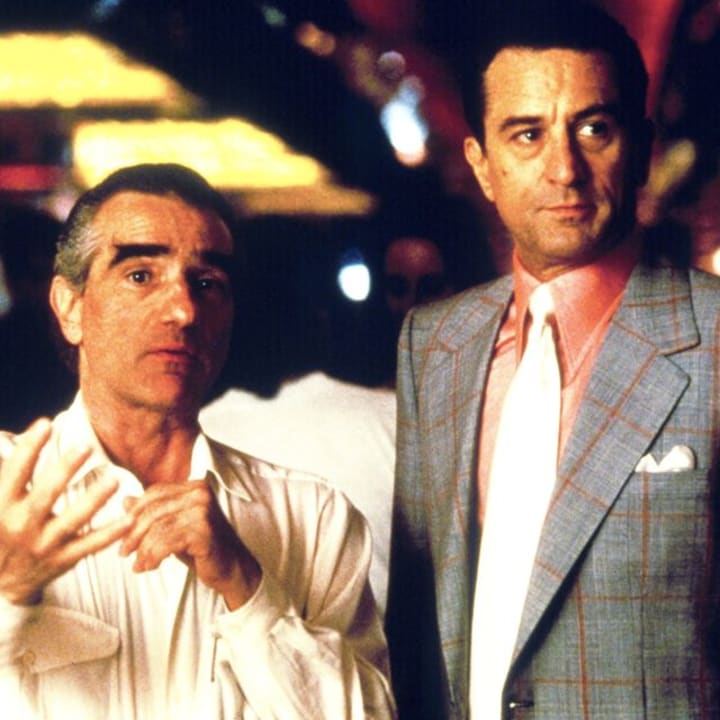If Pythagoras, Then Popcorn
From Popcorn to Pythagoras, how to know what movies you really like.

There is a formula for deciding what to watch next. Really, there is.
And I’m going to share it with you. Here ya go...
X+A(-X)-B+(Cx0.33)+(D+/-5)=Y
Not bad, huh? The succinct beauty of that equation would even have Stephen Hawking waxing lyrical about maths again.
What do you mean that makes no sense to you? Not a mathematician eh? Ok, I’ll do my best to break it down a little for those messing around at the back.
So, let’s start by looking at how we conventionally make movie recommendations to each other around the water cooler. Usually we recommend things to our friends or colleagues based on (a) an actor we like or (b) the genre. Let’s call this the ‘conventional approach’.
Now, let me be clear - there is merit in this conventional approach and it works in some cases, however it does not necessarily scratch the itch we really want it to when it comes to movies, and it’s certainly not as eloquent as our proposed formula above.
Why does it not scratch our itch sufficiently? Well, let’s test a few examples.
I like Terminator 2. Bloody great film for its time, one of the few recognised movies where a sequel is better than the original.
So given our conventional approach of recommending further movies based on the lead actor (Arnie in this case), I would have to recommend the following; Predator, Commando, Jingle All The Way, Twins, Junior, Batman & Robin, Maggie, The Expendables or Kindergarten Cop.
Now, I would hazard a guess that only 2 out of that list (the first 2) would come close to matching my expectations of a similar ‘Arnie movie experience’. And I’d still be disappointed there were no time travelling cyborgs.
And if we adopted for option ‘B’ of our conventional approach (based on genre), let’s say sci-fi / time travel, then we might be recommended Back To The Future, Hot Tub Time Machine, The Time Traveller’s Wife and Bill & Ted’s Excellent Adventure. None of which would have left me feeling itch free and I’d have a massive Arnie shaped hole in my life.
Ok this is an extreme example, but I use this to illustrate the problem with the conventional approach of recommending movies based primarily on the headline star or merely the subject matter.
Don‘t worry, we’re going to come back to that shining little equation that solves our problems shortly, but first let’s take a look at another example that illustrates where the flaw lies.
Let’s take a look at some of the best actors in the world.
You like DeNiro? Sure you do. Everyone likes DeNiro (except my girlfriend).
So what movies is he known for? Well, let’s name his highest box office movies / most acclaimed performances where he’s played the lead; Goodfellas, The Irishman, Cape Fear, Raging Bull, Taxi Driver, The King of Comedy and Mean Streets.
So what do these movies have in common? Robert DeNiro, right? Wrong, that’s just co-incidental.

The answer is Scorsese.
And herein lies the first element of our equation.
A = Director
The factor of A in our formula equals The Director. By far the most important influencing factor in any movie you’ve ever enjoyed.
The problem is, for the most part we don’t realise that’s why we liked the movie. Don’t get me wrong, Scorsese is probably one of the world’s most prominent Directors in movie history, so sure you probably knew he directed all those films listed above before I mentioned it, but what of a lesser known Director?
Does the average movie watcher (and I emphasise the word average here - I am certain that you dear reader are nothing less than an ardent film buff like me) really recognise their Ang Lee from their Frank Capra?
And this is crazy. Because the Director is undoubtedly the one with the vision for any movie, he or she is the one that talks to us and resonates with our soul.
We only think it’s the actor because they’re the frontman. The star of the show may well be talented, engaging, convincing or inspirational but they are at best a puppet enacting the vision of the Director.
B = Lead Actor
For clarity, we’re saying this element has a negative effect on our formula.
Put it this way, you’ve had a horrid break up with your boyfriend / girlfriend / significant other. After a period of listening to Elton John records and eating ice cream you find yourself back on the market.
Would you actively go looking for somebody that looked like your ex-partner? Has the idea of considering somebody’s worth based on their surface looks ever been considered a good idea? Of course not, you’d be called facile or shallow. You’d be telling me its what’s on the inside that counts, you can’t judge a book by its cover and not to just look skin-deep.
Well the same is true of a movie we love. It’s what is on the inside of that movie that makes the magic, not who’s on the publicity poster. And the mechanics of any movie are designed and engineered by the Director.
If you ever loved a film, it was because the Director connected with you on your wavelength, not because of the way the actor read out his lines. If we don’t like a film, chances are that also has a lot to do with the Director without us even knowing it.
Recognising the Actor v Director dynamic helps us understand the 2nd factor of our formula in that B equals Actor, and B (in our formula) is subtracted.
At this point, I figure you’re either with me on this or you’re jumping off the bus. You’re either agreeing with me that Directors are the actual cause of our great movie loves and actors are just coincidental or you’ve figured out why I was never picked for a lead role in the school nativity play.
Either way, allow me to try to convince you a little further.
Here’s a list of some of the most recognised Directors in the business, you’ve probably heard of most of them;
Quentin Tarantino, Oliver Stone, Ridley Scott, Woody Allen, Christopher Nolan, Steven Spielberg, Ron Howard, Sam Mendes, Tim Burton, Anthony Minghella, James Cameron, Michael Bay, Francis Ford Coppola, Stanley Kubrick, David Fincher, Sergio Leone, Peter Jackson, M.Night Shyamalan, Wes Anderson, Guillermo Del Toro, Jon Favreau.
Now here’s the clincher; Each one of these Directors creates their movies in a certain style. Some you’ll instantly recognise like a ‘Tarantino blood-fest’, or an ‘M.Night Shyamalan twist’ or a ‘Michael Bay special-effects-laden-action-thriller-with-an-incomprehensible-plot’.
Some you’ll love, some you’ll no doubt hate. But if you loved the way they constructed one of their movies (regardless of actor or genre), chances are you’ll also like the way they go about it next time. They’re just on your indefinable wavelength.
So, formula recap so far;
X is the movie we love. A is the Director of that movie (positive) and B is the Lead Actor (negative). X+A(-X)-B=Y
C = Screenwriter
We’re now going to add a further factor of C. The C-factor represents the screenwriter. Should this be a positive or a negative?
To recognise the true value a screenwriter brings to a project, we need only cast our minds back a decade or so to the strike by the Writers Guild of America in 2007-2008. The resultant effect was that the 4 biggest networks in the US (CBS, ABC, NBC and Fox) all had their primetime ratings decimated as no quality scripts were being produced. Late night talk show ratings declined and there was a surge in ‘unscripted’ shows such as reality TV or gameshows.
The effect on some shows was also detrimental. Anybody remember Season 2 of Heroes? Nope, that’s because they weren’t written by someone who knew what they were doing. A similar fate struck Battlestar Galactica and Pushing Daisies.
Equally, we can apply the same logic to screenwriters that we did to the DeNiro / Scorsese confusion. If you are of a romantic persuasion, let us consider 3 heart-warming films; Notting Hill, Love Actually and Four Weddings & A Funeral.
Regardless of whether you loved or hated these (not dissimilar) movies, what immediately springs to mind as their driving force?
Most people would say it’s Hugh Grant and his lovely foppish hair. But of course they’d be wrong again. The hidden fibre optic thread interwoven in these 3 films is actually the brilliant screenwriter Richard Curtis. In spite of Hugh’s appealing upper middle class English charm, it is actually the deft screenplay of Curtis that tugs on your heartstrings.
So yes, undoubtedly a top-notch screenwriter is key to ensuring fan satisfaction. They do quite evidently build the initial multi-coloured skeleton of any project.
Beyond Richard Curtis then, let’s clarify who we’re talking about. There are professional screenwriters like Laurence Kasdan, Robert Orci and Alex Kurtzman. There are also those that dabble in both writing and directing like Ethan and Joel Coen, Charlie Kaufman and Tarantino.
But confusingly, there has also been an upsurge in the last few decades of Directors receiving credits for screenwriting due to contractual stipulations even though this element actually had little to do with them.
And in many cases 2 or 3 writers may have been involved in a project at one time or another before being dispatched to Room 101 for writing a wobbly ending. Armageddon and Children of Men both had 5 screenwriters attached. This is really not unusual and is entirely normal within the industry.
And herein lies a 3-fold problem for our formula, as screenwriters are (a) less well known than the Directors, (b) subject to the whims of the Director and (c) they’re unlikely to have sole responsibility for the script anyhow.

So on this basis, for the purposes of our formula, we see the influence of a good screenwriter essentially as a positive, albeit one that is diluted to 1/3 of the overall dynamic.
Therefore C (Screenwriter) enhances our formula X+A(-X)-B+(Cx0.33)=Y
D = Time
The final element of our formula is Time. Woah, this is where things get trippy. Yes, we’re including a lateral dimension into our equation, but have faith and do not call Dr Strange out just yet.
How is time relevant?
As a child born of the 70’s I love Star Wars, the original trilogy 1977-1983 era. My kiddywinks don’t feel the same connection but they do love Daisy Ridley and the gang in the Disney sequels of 2015 – 2019. Sacrilege I know but that’s kids for you.
Similarly, I also love a John Hughes movie. St Elmo’s Fire, Ferris Bueller or The Breakfast Club. However my significant other cannot watch them. Having been born some years later in the 80’s (I’m punching above my weight I know), they are somewhat lost on her. Watching her trying to fathom the appeal of Emilio Estevez doing his detention dance is like watching a small child trying to comprehend why they’re being forced to eat their carrots instead of having some haribo.
The era (or decade) in which a film was made makes a huge difference to the themes, sub-themes, attitudes, references and nuances of a movie. You wouldn’t expect to pick up a dinosaur from the Triassic era and plop him in the late 20th century, would you? Of course not, he would be hugely out of step with pop culture and fashion for a start. In fact, I’m pretty sure Michael Crichton tried it and it was a big old mess for everyone.
If you like a particular movie and are looking for a similar experience, chances are you’re not going to get that high unless it was made in the same pop culture era (plus or minus 5 years either way). Loving The Avengers now doesn’t mean you’re going to get the same buzz watching Lou Ferrigno as the Hulk. Times change.
So D (Time) = Movie X +/- 5 years from release date.
So to summarise, the factors we see as key to finding a suitable recommendation are;
- Director of the movie we enjoyed =A
- Actor of the movie we enjoyed =B
- Screenwriter of the movie we enjoyed =C
- Year of production of the movie we enjoyed = D
Let’s identify the Test Values as;
- Movie we enjoyed = X
- Future movie being recommended =Y
Based on the arguments put forward above, this advances our equation to the final stratagem;
X (Good Movie) plus A (Director) minus X (the original Good Movie, as we’re not intending to watch the original movie twice) minus B (Actor) multiplied by 0.33 for C (Screenwriter), plus or minus 5 years from release = Y (Equally Good Movie).
And we therefore confidently propose our simplified but completed equation as X+A(-X)-B+(Cx0.33)+(D+/-5)=Y
Anyway to finish, it’s important that we demonstrate our magical algorithm in action a few times to add to the laboratory examples we’ve demonstrated so far - let us field test it, as it were.
From Theory to Reality
One of my all-time favourites is the brilliant 2010 movie Inception, a captivating roller-coaster of plot twists and turns in a brilliantly constructed uber-reality with Leonardo DiCaprio in the lead.
Groundbreaking for its time, not only with its advanced CGI techniques but also with its layered storytelling. This movie can be watched several times and you’ll still find new revelations. It’s like the Pandora’s Box of thriller movies.
Following our algebraic hocus pocus, we can now fill in the variables and see what we get.
X=Inception and A =Director Christopher Nolan. We can subtract B (bye Leo) and then multiply the chances of a jackpot by 0.33 for the screenwriter (C), in this case also Nolan.
So we’re now looking for all those movies Directed and / or Written by Nolan between our time period (D) of +/- 5 years, so between 2005 - 2015.
That gives us the following movies; The Prestige (2006), Interstellar (2014) and the Dark Knight trilogy (2005, 2008 and 2012).
If we disregard the Batman films (you’re either going to like superhero films or not), your recommended viewing (Y) should definitely be either The Prestige with Hugh Jackman or Interstellar with Matthew McConaughey. Both of these scored 4/5 stars on Decider, so definitely no duds here. If it’s layered plots, deft storylines and characters that keep you guessing, our algorithm has definitely struck gold.
OK, one more to prove to you that it wasn’t a fluke, and we‘ll go with the older, mind bending apocalyptic thriller 12 Monkeys (1995) starring Brad Pitt and Bruce Willis. I’ve always loved the gritty future reality of this film and the final twist is a stroke of genius.

The narrative of 12 Monkeys interweaves the plot into a believable tangle of futurism, realism and nihilism (honestly, so many ‘ism’s), and is very much character driven. You feel the desperation of Bruce Willis and you buy into the craziness of Brad Pitt.
So in terms of our formula, now our X=12 Monkeys and our A =Director Terry Gilliam. We subtract the celebs and then multiply the chances of a jackpot by 0.33 for the screenwriters (C) Janet & David Peoples (of Bladerunner fame).
So Terry Gilliam directed 2 other movies between 1990 and 2000, those being The Fisher King 1991 (Robin Williams) and Fear & Loathing in Las Vegas 1998 (Johnny Depp & Benicio Del Toro). Not seen them? What have you been doing since the 90’s?
I mean, what a stunning couple of recommendations to come out of that. Both are strong character driven stories reliant on beautifully crafted narratives in a similar manner to 12 Monkeys. Both of those movies also have 4/5 stars on Decider again so we know the formula works with Indy films too.
So there you have it - a proven methodology to decide what movie to watch next on Netflix, Amazon Prime, Hulu, Disney+, Paramount+ or wherever else you get your entertainment.
You’re very welcome. But for the record, the author of this proposal would like it clarified that he accepts no responsibility for the validity of the dubious maths used here. Algebra was never a strong point and frankly neither was the school Nativity Play, but then again I never actually promised you A Theory of Everything.
About the Creator
David Calvert
Just here for fun : )






Comments
There are no comments for this story
Be the first to respond and start the conversation.